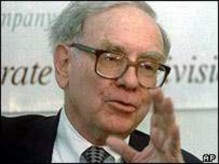Warren Buffet on derivatives – Editor
 The following are edited excerpts from the Berkshire Hathaway annual report for 2002, written by Warren Buffet. We are grateful to William Hummel for drawing our attention to this material.
The following are edited excerpts from the Berkshire Hathaway annual report for 2002, written by Warren Buffet. We are grateful to William Hummel for drawing our attention to this material.
Basically derivatives call for money to change hands at some future date, with the amount to be determined by one or more reference items, such as interest rates, stock prices, or currency values. For example, if you are either long or short an S&P 500 futures contract, you are a party to a very simple derivatives transaction, with your gain or loss derived from movements in the index.
Derivatives contracts are of varying duration, some running for years, and their value is often tied to several variables.
Unless derivatives contracts are collateralized or guaranteed, their ultimate value also depends on the creditworthiness of the counter-parties to them. But before a contract is settled, the counter-parties record profits and losses – often huge in amount – in their current earnings statements without so much as a penny changing hands.
Reported earnings on derivatives are often wildly overstated. That’s because today’s earnings are in a significant way based on estimates whose inaccuracy may not be exposed for many years.
Web references:
The derivatives genie is now well out of the bottle, and these instruments will almost certainly multiply in variety and number until some event makes their toxicity very clear. Central banks and governments have so far found no effective way to control or even monitor the risks posed by these contracts. In my view, derivatives are financial weapons of mass destruction, carrying dangers that, while now latent, are potentially lethal.






























